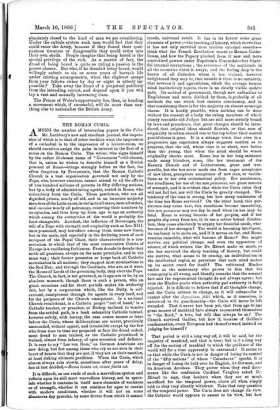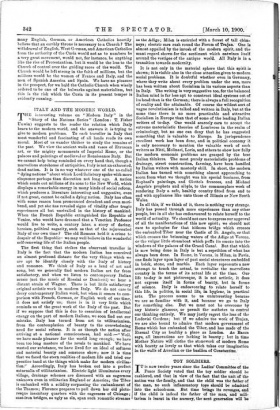THE ROMAN CURIA.
AMONG the number of interesting papers in the Pilot, Mr. Lathbury's new and excellent journal, the impres- sion of which is to that of other weeklies what the impression of a cathedral is to the impression of a lecture-room, we should ourselves assign the palm in interest to the first of a series on the Roman Curia. The writer, who signs himself by the rather ill-chosen name of " Caractacus "—ill-chosen, that is, unless he wishes to describe himself as a British prisoner of Rome—brings strongly before us the fact, too often forgotten by Protestants, that the Roman Catholic Church is a vast organisation governed not only by the Pope, who, however absolute, cannot attend to all the affairs of two hundred millions of persona in fifty differing nations, but by a body of administrating agents, seated in Rome, who collectively form the Curia. These gentlemen, who are all dignified priests, nearly all old, and in an immense majority mem hers of t he Latin races, investigate all cases, issue all orders, and exercise nearly all patronage, renewing their numbers by co-optation, and thus keep up from age to age an authority which among the authorities of the world is probably the least changeable. Accident, the influence of Sovereigns, the will of a Pope with strength and originality such as Leo XIII. once possessed, may introduce among them some new blood, but in the main, and especially in the declining years of each occupant of the Papal Chair, their characteristic is a con- servatism to which that of the most conservative Courts of Europe is a vacillating feebleness. From decade to decade they settle all questions, always on the same principles, and in the same way ; their favour promotes or keeps back all Catholic ecclesiastics in all nations ; they suggest most nominations to the Red Hat; and through the Cardinals, who are, as it were, the House of Lords of the governing body, they elect the Pope. The Church, in fact, is not governed, as it appears to be, by an absolute monarch, though there is such a person, who on great occasions and for short periods makes his authority felt, but by a corporation which, like the Deity, is self- existent, omnipresent through its agents in every land, and for the purposes of the Church omnipotent. Is a national Church recalcitrant, is a Catholic people "out of hand," is a Catholic teacher, or preacher, or Bishop inclined to wander from the settled path, is a book ostensibly Catholic tainted, however subtly, with heresy, the case comes sooner or later before the Curia, whose deliberations are secret, practically unrecorded, without appeal, and irresistible except by the few who from time to time are prepared to face the dread ordeal, most dread to men trained, as the Catholic priesthood is trained, almost from infancy, of open secession and defiance. It is easy to cry "Los von Rom," as German Austrians are now doing, but few among those who cry so are sure in their heart of hearts that they are not, if they act on their emotion, at least risking ultimate perdition. When the Curia, which almost always acts slowly, sometimes after years of delay, has at last decided,—Roma locuta est, causa finita est.
It is difficult, as one reads of such a marvellous system and reflects upon its still more marvellous history, not to specu- late whether it contains in itself more elements of weakness or of strength, whether it can continue for ages to coexist with modern conditions, whether it will not on some disastrous day provoke, by some decree from which it cannot
recede, universal revolt. It has in its favour some great elements of power ;—the teaching of history, which shows that it has not only survived most terrible external assaults—. think what the French Revolution meant to Roman Catho- licism, and how the Papacy plucked from it new and more centralised powers under Napoleon's Concordat—but fright- ful internal corruptions ; the reverence of the multitude in all the countries which it sways; and the feeling deep in the hearts of all Catholics whom it has trained, however enlightened they may be, that outside it there is no certainty, that between it and agnosticism, which the average human mind instinctively rejects, there is no clearly visible middle path. Its method of government, though now unfamiliar to Englishmen and much disliked by them, is probably of all methods the one which best ensures consistency, and in that consistency there is for the majority an almost sovereign charm. It is hardly possible, when nothing can be done without the consent of a body the ruling members of which closely resemble old Judges but are still more strictly bound by laws and precedents, that great changes should be intro- duced, that original ideas should flourish, or that men of originality in action should rise to the top before their mental youthfulness is gone. It is a strange truth that even in a progressive age experience always suggests caution as to progress, that the old, whose time is so short, wait better than the young, that when the mind should be wisest originality shocks most. Rome has in her long existence made many blunders, some, like her treatment of the Eastern Church and of Lutheranism, great and irre- parable, but she has never made one from eager acceptance of new ideas, precipitate acceptance of new men, or vacilla- tions as to her own ecclesiastical policy. Her persistence, her steadiness, her use of the non possumus, are great sources of strength, and it is evident that while the Curia roles they will not fail her, nor will the Curia be greatly changed. The tendency of the time is strong, but how many tendencies of the time has Rome survived ? On the other hand, this per- sistence may cause hate, this steadiness become immobility, this non possumus may one day be used when its use may be fatal. Rome is strong because of her peoples, and if her peoples slip away from her, if, to use a rather brutal illustra- tion, they cease absolutely to supply her financial needs, what becomes of her strength ? The world is becoming intelligent, its tendency is to move on, and if it moves on far, and Rome remains immobile, what will become of Rome ? She might survive any political change, and even the opposition of science, of which writers like Dr. Mivart make so much, as she has survived the sharp teaching of history, but could she survive, what seems to be coming, an individualism in the intellectual region so prevalent that each mind makes up its secret creed for itself ? The cultivated Hindoo smiles at the missionary who proves to him that his cosmogony is all wrong, and blandly remarks that the sensual fact and the suprasensnal thought do not always agree ; but even the Hindoo quails when authority qua authority is flatly rejected. It is difficult to believe that if all thoughts change, and the Curia refuses to change, as it will refuse—for it cannot alter the depositum *lei which, as it conceives, is entrusted to its guardianship—the Curia will never be left stranded. That it never has been yet, that from age to age great masses of mankind have always recemented themselves to "the Rock," is true, but will that always be so ? The Church survived Galileo, but how if, because of Galileo'a condemnation, every European had thenceforward insisted on judging for himself ?
That period is still a long way off, it will be said, for the majority of mankind, and that is true ; but is it a long way off for the section of mankind to which the guidance of the world will for a time apparently be entrusted ? It seems to us that while-the Curia is not in danger of losing its control of the "fifty nations" of whom " Caractacus " speaks, it is in danger of losing its hold over its English, its German, and its American devotees. They quiver when they read docu- ments like the confession Cardinal Vaughan asked Dr. Mivart to sign, they hesitate when they see so much sacrificed for the temporal power, above 411 when simply told to obey they silently withdraw. Take that very question of the temporal power. The Curia does not change its view, the Catholic world appears to assent to its view, but how many English, German, or American Catholics heartily believe that an earthly throne is necessary to a Church ? The withdrawal of English, West German, and American Catholics from the authority of the Curia would not as to numbers be a very great movement, would not, for instance, be anything like the rise of Protestantism, but it would be the loss to the Church of control over the guiding races of the world. The Church would be left strong in the faith of millions, but the millions would be the women of France and Italy, and the men of Spanish America and Spain. We have no pleasure in the prospect, for we hold the Catholic Church when wisely ordered to be one of the bulwarks against materialism, but this is the risk which the Curia in its present temper is evidently running.







































 Previous page
Previous page